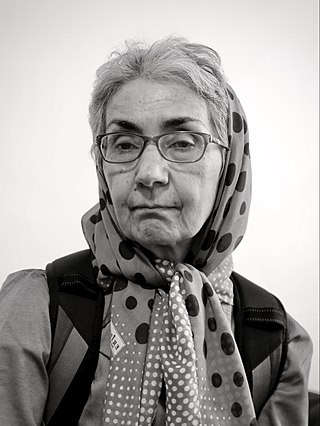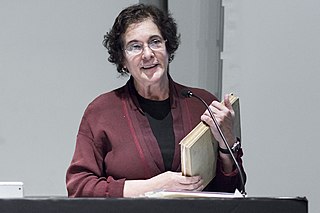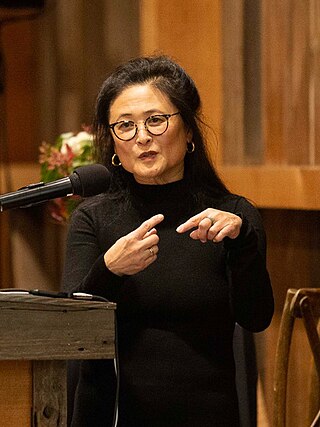Related Research Articles

The Radcliffe Institute for Advanced Study at Harvard University, also known as the Harvard Radcliffe Institute, is an institute of Harvard University that fosters interdisciplinary research across the humanities, sciences, social sciences, arts, and professions. It came into being in 1999 as the successor institution to the former Radcliffe College, originally a women's college connected with Harvard.
Lois Wendland Banner is an American author and emeritus professor of history at the University of Southern California. She is one of the earliest academics to focus on women's history in the United States. Her work includes biographies of Margaret Mead, Ruth Benedict, Marilyn Monroe and Greta Garbo as well as the textbook Women in Modern America: A Brief History.

Afsaneh Najmabadi is an Iranian-born American historian, gender theorist, archivist, and educator. She is the Francis Lee Higginson Professor of History and of Studies of Women, Gender, and Sexuality at Harvard University.

Lila Abu-Lughod is an American anthropologist. She is the Joseph L. Buttenweiser Professor of Social Science in the Department of Anthropology at Columbia University in New York City. She specializes in ethnographic research in the Arab world, and her seven books cover topics including sentiment and poetry, nationalism and media, gender politics and the politics of memory.

Lisa Lowe is Samuel Knight Professor of American Studies at Yale University, and an affiliate faculty in the programs in Ethnicity, Race, and Migration and Women's, Gender, and Sexuality Studies. Prior to Yale, she taught at the University of California, San Diego, and Tufts University. She began as a scholar of French and comparative literature, and since then her work has focused on the cultural politics of colonialism, immigration, and globalization. She is known especially for scholarship on French, British, and United States colonialisms, Asian migration and Asian American studies, race and liberalism, and comparative empires.
Antoinette M. Burton is an American historian, and Professor of History and Bastian Professor of Global and Transnational Studies at the University of Illinois, Urbana-Champaign. On November 23, 2015, Burton was named Chair of the University of Illinois' search for a permanent Chancellor after the resignation of Phyllis Wise.
Françoise Lionnet serves as acting chair of the Committee on Degrees in Studies of Women, Gender and Sexuality at Harvard University, where she is professor of Romance languages and literatures, comparative literature, and African and African American studies. She is distinguished research professor of comparative literature and French and Francophone studies at UCLA, and a research associate of the Centre for Indian Studies in Africa at the University of Witwatersrand, Johannesburg. She served as director of the African Studies Center and Program Co-Director of UCLA's Mellon Postdoctoral Fellowship in the Humanities: Cultures in Transnational Perspective.
Nancy Joan Hirschmann is an American political scientist. She is the Geraldine R. Segal Professor in American Social Thought at the University of Pennsylvania where she specializes in the history of political thought, analytical philosophy, feminist theory, disability theory, and the intersection of political theory and public policy.
Jigna Desai is a Professor in the Department of Gender, Women and Sexuality Studies and Asian American Studies, currently at the University of Minnesota. She is a writer, teacher, mentor, artist, and engaged researcher whose scholarship crosses many fields of study including transnational feminism, Asian American Studies, queer studies, postcolonial feminism, critical disability studies, critical youth studies, feminist media studies, critical ethnic studies, and critical university studies. She has also written extensively on issues of racial and gender disparities and social justice.
Monica H. Green is an independent scholar who specializes in premodern and medieval plagues and medicine. She also has extensive research into medieval women and how gender affected Western healthcare. She was inspired to research women and gender's role in premodern healthcare after reading Christine de Pizan's "Book of the City of Ladies".
Mari Ruti was a Finnish-Canadian philosopher. She had served as Distinguished Professor of Critical Theory and of Gender and Sexuality Studies on the graduate faculty at the University of Toronto in Toronto, Canada, and as an Undergraduate Instructor at their Mississauga campus. She was an interdisciplinary scholar within the theoretical humanities working at the intersection of contemporary theory, continental philosophy, psychoanalytic theory, cultural studies, trauma theory, posthumanist ethics, gender, and sexuality studies.
Susan Zaeske is Professor of Rhetoric and Public Culture in the Department of Communication Arts and Arts and was formerly Associate Dean for Arts and Humanities in the College of Letters & Science at the University of Wisconsin-Madison.
Mark D. Jordan is a scholar of Christian theology, European philosophy, and gender studies. He is currently the Richard Reinhold Niebuhr Research Professor of Divinity at Harvard Divinity School and Professor of the Studies of Women, Gender, and Sexuality in the Harvard Faculty of Arts and Sciences.
Jane Chance, also known as Jane Chance Nitzsche, is an American scholar specializing in medieval English literature, gender studies, and J. R. R. Tolkien. She spent most of her career at Rice University, where since her retirement she has been the Andrew W. Mellon Distinguished Professor Emerita in English.
Banu Subramaniam is a professor of women, gender and sexuality studies at the University of Massachusetts, Amherst. Originally trained as a plant evolutionary biologist, she writes about social and cultural aspects of science as they relate to experimental biology. She advocates for activist science that creates knowledge about the natural world while being aware of its embeddedness in society and culture. She co-edited Making Threats: Biofears and Environmental Anxieties (2005) and Feminist Science Studies: A New Generation (2001). Her book Ghost Stories for Darwin: The Science of Variation and the Politics of Diversity (2014) was chosen as a Choice Outstanding Academic Title in 2015 and won the Society for Social Studies of Science Ludwik Fleck Prize for science and technology studies in 2016. Her most recent book, Holy Science: The Biopolitics of Hindu Nationalism (2019), won the Michelle Kendrick Prize for the best book from the Society for Literature, Science, and the Arts in 2020.
Elizabeth A. Wilson is a Samuel Candler Dobbs professor of women’s, gender, and sexuality studies at Emory University. She is a scholar of feminist science studies, and her work brings together psychoanalytic theory, affect theory, feminist and queer theory, and neurobiology. She is the author of Neural Geographies: Feminism and the Microstructure of Cognition (1998), Psychosomatic: Feminism and the Neurological Body (2004), Affect and Artificial Intelligence (2010), and Gut Feminism (2015).

Jacqueline D. Wernimont is an American academic who is the Distinguished Professor in Digital Humanities and Social Engagement at Dartmouth College. Her first book, Numbered Lives Life and Death in Quantum Media, was released by MIT Press in January 2019. It is the first book to map connections in feminist media history. She is the founding Director of Human Security Collaborator, a collaboration of interdisciplinary academics working on digital civil rights and big data.

Jennifer Christine Nash is the Jean Fox O'Barr Professor of Gender, Sexuality, and Feminist Studies at Duke University within its Trinity College of Arts and Sciences and Director of the Black Feminist Theory Summer Institute. In 2016, Nash arrived at Northwestern University, where she worked as an Associate Professor of African American Studies and Gender and Sexuality Studies before joining Duke University in 2020. Her research interests include Black feminist theory, feminist legal theory, Black sexual politics, black motherhood, black maternal health, race and law, and intersectionality.
Jyoti Puri is Hazel Dick Leonard Chair and Professor of Sociology at Simmons University. She is a leading feminist sociologist who advocates for transnational and postcolonial approaches to the study of gender, sexuality, state, nationalism, and death and migration. She has published three books, and her most recent book, Sexual States: Governance and the Struggle Against the Antisodomy Law in India’s Present received the Distinguished Book Award from the Sociology of Sexualities Section of the American Sociological Association. She has delivered keynote lectures and given talks across a wide range of universities in North America and Europe.
Elizabeth Freeman was an English professor at the University of California, Davis, and before that Sarah Lawrence College. Freeman specialized in American literature and gender/sexuality/queer studies. She served as Associate Dean of the Faculty for Humanities, Arts, and Cultural Studies at the University of California, Davis.
References
- ↑ "Durba Mitra". Wolf Humanities Center. 2015-03-12. Retrieved 2024-05-16.
- 1 2 "Social Theory from the Global South: In Conversation with Durba Mitra, Andrew Liu, Anupama Rao". Borderlines. 2021-06-18. Retrieved 2024-05-30.
- 1 2 3 "Challenging the Norms: Durba Mitra Comes to Harvard | Magazine | The Harvard Crimson". www.thecrimson.com. Retrieved 2024-05-16.
- ↑ mbolot@harvardmag.com (2018-09-07). "Durba Mitra studies gender in South Asia | Harvard Magazine". www.harvardmagazine.com. Retrieved 2024-05-16.
- ↑ "Tools for Success | Emory University | Atlanta GA". gs.emory.edu. Retrieved 2024-05-16.
- ↑ "WGS Hires First Full-Time Professor | News | The Harvard Crimson". www.thecrimson.com. Retrieved 2024-05-16.
- 1 2 3 "All Events | U-M LSA Women's and Gender Studies". lsa.umich.edu. Retrieved 2024-05-16.
- ↑ "Durba Mitra | Fordham History" . Retrieved 2024-05-30.
- ↑ "Durba Mitra Curates Radcliffe Exhibit". wgs.fas.harvard.edu. Retrieved 2024-05-30.
- ↑ "Durba Mitra (And Her New Book) Featured in the Harvard Gazette". wgs.fas.harvard.edu. Retrieved 2024-05-30.
- ↑ "Durba Mitra". wgs.fas.harvard.edu. Retrieved 2024-05-16.
- ↑ "Indian Sex Life". press.princeton.edu. January 7, 2020. Retrieved 2024-05-16.